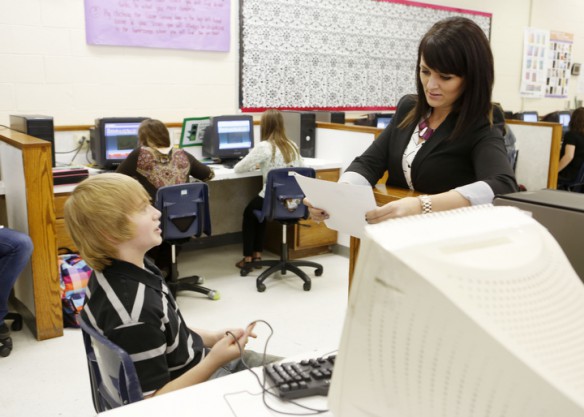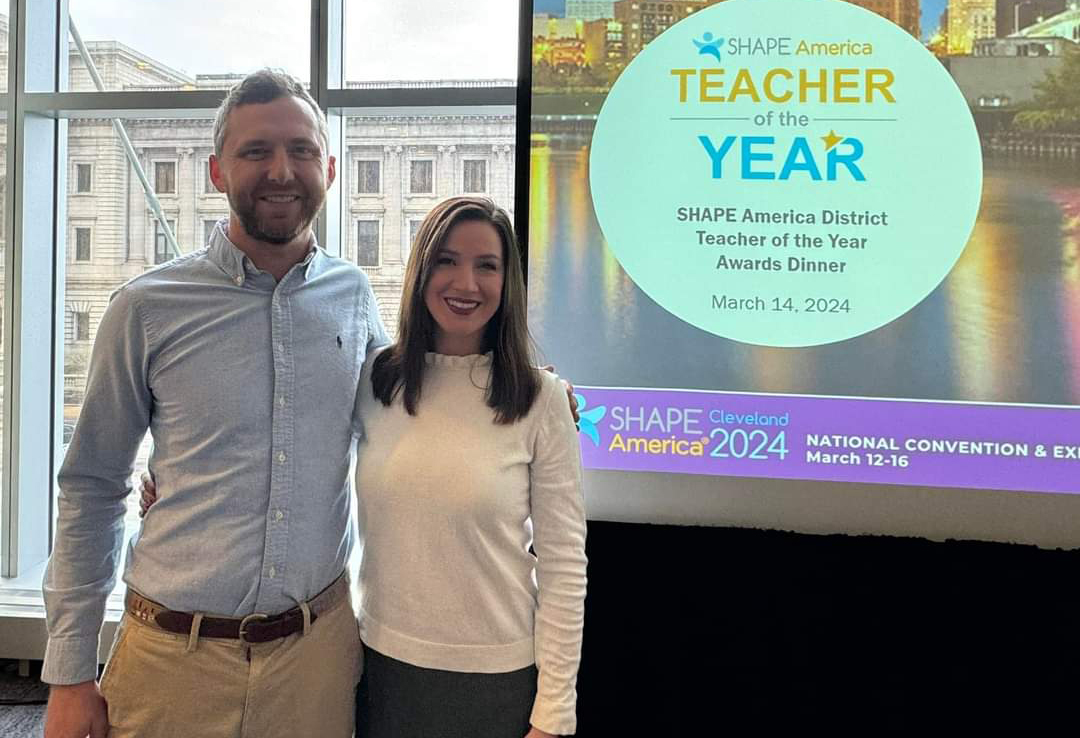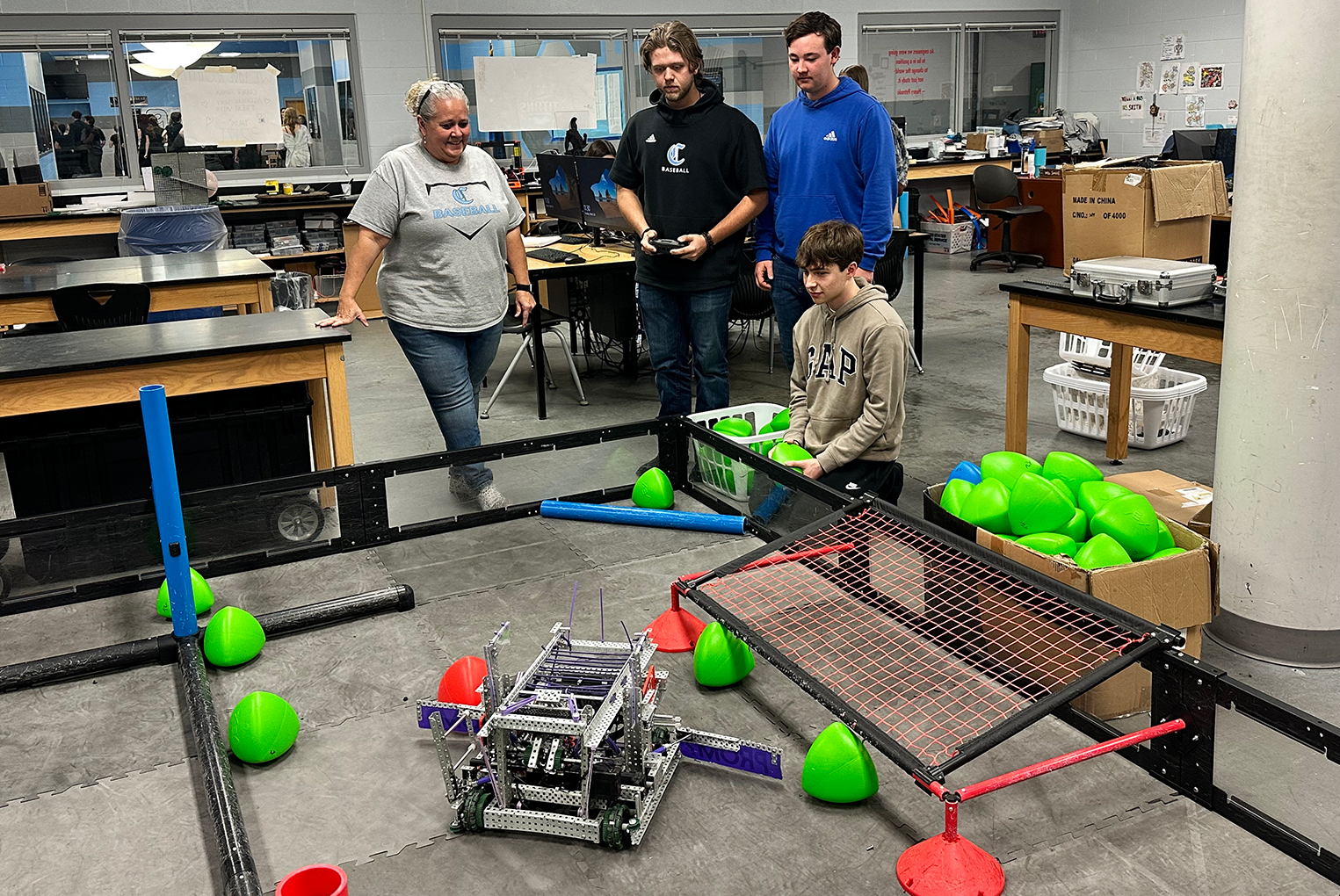
Brooke Whitlow helps 8th-grade student Derek Grant prepare for an interview for a position on the school’s weekly newscast at East Hardin Middle School (Hardin County). Grant was interested in the AV technician position.
Photo by Amy Wallot, Oct. 21, 2013
By Matthew Tungate
matthew.tungate@education.ky.gov
Beginning this year, students who graduate from Hardin County school district’s high schools with a Work Ethic Certification are guaranteed an interview with participating businesses.
Dan Robbins, principal of the Hardin County Early College and Career Center, said more than 25 business partners have agreed to interview certified students for jobs for which they are qualified. Students may even be able to reserve the interview until after they graduate from college, opening them to higher level jobs, he said.
“The people in our community want to be involved so heavily (with schools). It almost brings tears to your eyes,” Robbins said. “They know about the economic impact this will have on our area by having people that are ready to work, that we have a workforce that is here so that when new companies are looking to expand and grow, Hardin County is definitely a place for them.”
Starting this year, high school seniors can elect to participate in the Work Ethic Certification program. They must demonstrate proficiency in eight standards to earn the certification. Combined with the criteria and standards they must meet, Work Ethic Certification participants are taught the Junior Achievement curriculum on career success from community volunteers.
John Wright, community relations specialist for the Hardin County school district, said teaching students about work ethic has “kind of always been on our radar.”
But it got new life when a group of 30 school district and business community members visited Elkhorn Crossing School (Scott County) last year looking for ideas for the Early College and Career Center, which is now under construction, he said.
Robbins said community members on the way back said things like, “‘We love being able to have these kids that have these skilled trades and are ready to go to work, but what we need is kids that can stay at work, kids that will show up on time, kids that can pass a drug screening.’ These are some of the things they were adamant about.”
Through continued conversations with the local Chamber of Commerce and additional research, the district developed what it calls the “Great Eight” work ethic standards and target behaviors.
To receive certification, students learn and demonstrate dressing for success, teamwork, resume writing, interview skills and problem solving, Robbins said. Students also must complete a resume, cover letter and portfolio that includes documented attendance, academic achievement and teacher commendations.
Students are scored on a rubric and must complete a culminating interview with a member of the business community and a school district employee, Robbins said. Students who pass will receive a special seal on their diploma, wear special cords during graduation and be guaranteed an interview at participating businesses.
Students already have completed the seven-week Junior Achievement portion at North Hardin High School, where Lisa Slaven is a family and consumer sciences teacher. She said she likes the program because grades are not a true indicator of a student’s work ethic.
“You have those straight-A students who must have something driving them, innate or external,” Slaven said. “But what about a C student? A D student? Does that mean they are not highly capable in the work field? Many students need an interest, a motivator or a purpose. They could find those things in a job/career of interest.”
Work Ethic Certification is more than just the capstone senior program, though. Robbins said principals at every level see the value of a strong work ethic.
“We know that we can’t wait until their senior year to get it going, that this has to be something that we create as part of our natural curriculum,” he said. “Outside of teaching them math and English and things, we have to teach these everyday skills to make them the best, most well-rounded student.”
Wright said the district has asked teachers to incorporate the “Great Eight” standards naturally into their classes, not as an addition curriculum. The district also has posted green and yellow “Great Eight” posters in schools.
“Even preschool kids, we want them to know what the ‘Great Eight’ is,” he said. “We want this to be a way of life.”
It is a way for life for East Hardin Middle School students in Brooke Whitlow’s technology education class.
Whitlow has students clock in and out to take attendance using Parktime.com. She tried to find an old-fashioned punch clock but couldn’t find one, she said.
“The idea is for this class to become their job,” Whitlow said.
She is using project-based learning for her 7th- and 8th-grade classes, which will be responsible for creating a newspaper and television program, respectively. Students will complete their Individual Learning Plan (ILP), and then create a resume and cover letter to apply for “jobs” with their respective projects, Whitlow said.
“We want them to learn technology in an authentic environment,” she said.
Because of the authentic learning environment, students should see the benefits of the work-ethic standards, Whitlow said.
“Every single thing that is going to be happening is going to hit every one of our standards,” she said. “Having a good work ethic is something that you can start really young. I think these standards are going to help us change the mindset of the students that are in our district.”
Slaven said career and technical educators (CTE) teach work ethic in all of their classes. She has a co-op class where students work at local day cares and preschools.
“We go over expectations and students sign a contract agreeing to uphold those standards at their placement,” Slaven said. “Additionally students create a professional growth plan based on needs identified by their placement. It’s important for students to see feedback from professionals and be able to use constructive criticism to improve. Hopefully they will take that into the workforce and never become stagnant – instead continuing to improve. That’s what will create a powerful workforce to be innovative and groundbreaking for years to come.”
Robbins said businesspeople regularly tell him that is what they need.
“It’s great to be college- and career-ready, and I want every student to be college- and career-ready. But if they don’t have work ethic, then being college- and career-ready won’t get them anywhere,” he said.
MORE INFO …
Dan Robbins, dan.robbins@hardin.kyschools.us, (270) 769-7930








Leave A Comment